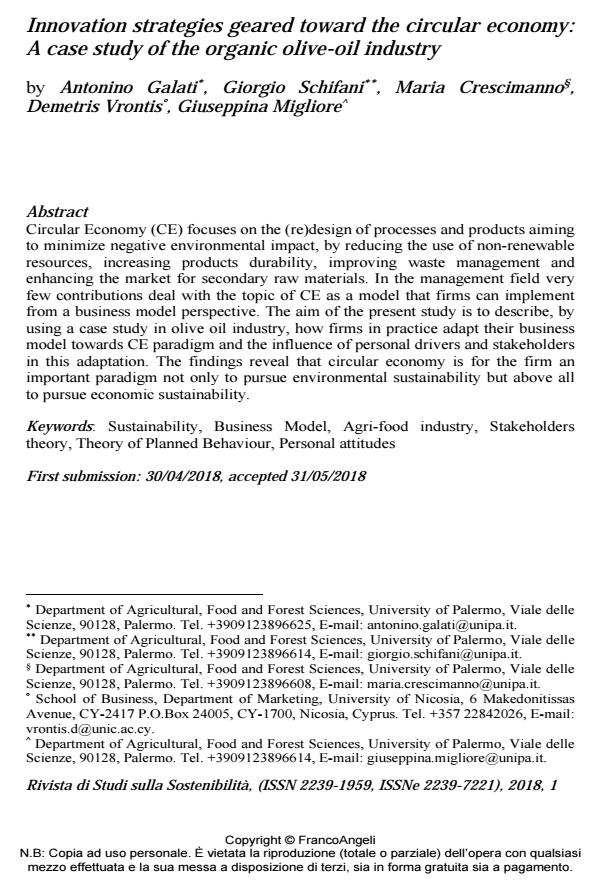Innovation strategies geared toward the circular economy: A case study of the organic olive-oil industry
Titolo Rivista RIVISTA DI STUDI SULLA SOSTENIBILITA'
Autori/Curatori Antonino Galati, Giorgio Schifani, Maria Crescimanno, Demetris Vrontis, Giuseppina Migliore
Anno di pubblicazione 2018 Fascicolo 2018/1
Lingua Inglese Numero pagine 22 P. 137-158 Dimensione file 243 KB
DOI 10.3280/RISS2018-001011
Il DOI è il codice a barre della proprietà intellettuale: per saperne di più
clicca qui
Qui sotto puoi vedere in anteprima la prima pagina di questo articolo.
Se questo articolo ti interessa, lo puoi acquistare (e scaricare in formato pdf) seguendo le facili indicazioni per acquistare il download credit. Acquista Download Credits per scaricare questo Articolo in formato PDF

FrancoAngeli è membro della Publishers International Linking Association, Inc (PILA)associazione indipendente e non profit per facilitare (attraverso i servizi tecnologici implementati da CrossRef.org) l’accesso degli studiosi ai contenuti digitali nelle pubblicazioni professionali e scientifiche
Circular Economy (CE) focuses on the (re)design of processes and products aiming to minimize negative environmental impact, by reducing the use of non-renewable resources, increasing products durability, improving waste management and enhancing the market for secondary raw materials. In the management field very few contributions deal with the topic of CE as a model that firms can implement from a business model perspective. The aim of the present study is to describe, by using a case study in olive oil industry, how firms in practice adapt their business model towards CE paradigm and the influence of personal drivers and stakeholders in this adaptation. The findings reveal that circular economy is for the firm an important paradigm not only to pursue environmental sustainability but above all to pursue economic sustainability.
Parole chiave:Sustainability, Business Model, Agri-food industry, Stakeholders theory, Theory of Planned Behaviour, Personal attitudes
- An exploratory study into emerging market SMEs’ involvement in the circular Economy: Evidence from India’s indigenous Ayurveda industry Vijay Pereira, M.K. Nandakumar, Sreevas Sahasranamam, Umesh Bamel, Ashish Malik, Yama Temouri, in Journal of Business Research /2022 pp.188
DOI: 10.1016/j.jbusres.2021.12.053 - Designing business models in circular economy: A systematic literature review and research agenda Piera Centobelli, Roberto Cerchione, Davide Chiaroni, Pasquale Del Vecchio, Andrea Urbinati, in Business Strategy and the Environment /2020 pp.1734
DOI: 10.1002/bse.2466 - Environmentally Friendly Business Practices among Low-Income Households in Rural Peninsular Malaysia Abdullah Al Mamun, Kanniga Malar Mohan, Noorshella Che Nawi, Muhammad Mehedi Masud, Rajennd Muniady, Noor Raihani Zainol, in Sustainability /2020 pp.7338
DOI: 10.3390/su12187338 - Food loss and waste: the new buzzwords. Exploring an evocative holistic 4Es model for firms and consumers Mariantonietta Fiore, in EuroMed Journal of Business /2021 pp.526
DOI: 10.1108/EMJB-07-2020-0080 - Does Green Entrepreneurial Orientation Improve the Sustainable Performance of Agribusiness? Evidence from China Xiang Zhang, Xiu-e Zhang, Liu Yang, in Sage Open 21582440241271110/2024
DOI: 10.1177/21582440241271110 - Trends in the circular economy applied to the agricultural sector in the framework of the SDGs Giuseppe Craparo, Elisa Isabel Cano Montero, Jesús Fernando Santos Peñalver, in Environment, Development and Sustainability /2023 pp.26699
DOI: 10.1007/s10668-023-03750-8 - How blockchain technology generates a trust-based competitive advantage in the wine industry: a resource based view perspective Raffaele Silvestri, Nino Adamashvili, Mariantonietta Fiore, Antonino Galati, in European Business Review /2023 pp.713
DOI: 10.1108/EBR-10-2022-0217 - Examining the dark side of human resource analytics: an empirical investigation using the privacy calculus approach Sheshadri Chatterjee, Ranjan Chaudhuri, Demetris Vrontis, Evangelia Siachou, in International Journal of Manpower /2022 pp.52
DOI: 10.1108/IJM-02-2021-0087 - Insights and dynamics of circular business model in developing countries' context: The empirical analysis of the returnable glass bottles process Obiora Ezeudu, Christopher Kennedy, in Business Strategy & Development e349/2024
DOI: 10.1002/bsd2.349 - An Automated Method for Detection and Enumeration of Olive Trees Through Remote Sensing Muhammad Waleed, Tai-Won Um, Aftab Khan, Zubair Ahmad, in IEEE Access /2020 pp.108592
DOI: 10.1109/ACCESS.2020.2999078 - Improving startups through excellence initiatives: addressing circular economy and innovation Simone Sehnem, Ana Cláudia Lara, Karen Benetti, Kurt Schneider, Maiara Lais Marcon, Tiago Hilário Hennemann da Silva, in Environment, Development and Sustainability /2023 pp.15237
DOI: 10.1007/s10668-023-03247-4 - The Monitoring of Selected Heavy Metals Content and Bioavailability in the Soil-Plant System and Its Impact on Sustainability in Agribusiness Food Chains Melánia Feszterová, Lýdia Porubcová, Anna Tirpáková, in Sustainability /2021 pp.7021
DOI: 10.3390/su13137021 - Challenges for the European research in organic fruit production Eligio Malusà, Davide Neri, in Frontiers in Horticulture 1225780/2023
DOI: 10.3389/fhort.2023.1225780 - Evaluation of Olive Cake Management Options in Jordan using Rapid Impact Assessment Matrix Salah H. Aljbour, Adnan Al-Harahsheh, Nabeel A. Jarrah, Husam Al-Hamaiedeh, Tayel El-Hasan, Sajeda Al-Rahaifeh, in Ecological Chemistry and Engineering S /2025 pp.515
DOI: 10.2478/eces-2025-0027
Antonino Galati, Giorgio Schifani, Maria Crescimanno, Demetris Vrontis, Giuseppina Migliore, Innovation strategies geared toward the circular economy: A case study of the organic olive-oil industry in "RIVISTA DI STUDI SULLA SOSTENIBILITA'" 1/2018, pp 137-158, DOI: 10.3280/RISS2018-001011